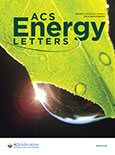期刊名称:ACS ENERGY LETTERS
|
ISSN: | 2380-8195
|
|
出版频率: | Monthly
|
|
出版社: | AMER CHEMICAL SOC, 1155 16TH ST, NW, WASHINGTON, USA, DC, 20036
|
|
出版社网址: | https://pubs.acs.org/
|
|
期刊网址: | https://pubs.acs.org/journal/aelccp
| |
影响因子: | 23.101 |
| 主题范畴: | CHEMISTRY, PHYSICAL; ELECTROCHEMISTRY; ENERGY & FUELS; NANOSCIENCE & NANOTECHNOLOGY; MATERIALS SCIENCE, MULTIDISCIPLINARY |
| 变更情况: | Newly Added by 2017 |
 期刊简介(About the journal) 期刊简介(About the journal)
 投稿须知(Instructions to Authors) 投稿须知(Instructions to Authors)
 编辑部信息(Editorial Board) 编辑部信息(Editorial Board)
 About the journal About the journal

Journal Scope
ACS Energy Letters publishes papers that report new scientific advances in all aspects of energy research. Topics related to capture, conversion and storage of energy are listed below.
- Energy Materials, Light Harvesting Assemblies
- Energy Conversion Processes (Catalysis and photocatalysis)
- Solar Fuels (Hydrogen production, CO2 reduction)
- Inorganic, organic and hybrid photovoltaics
- Photosynthesis and Biofuels
- Fuel cells, Storage Batteries and Supercapacitors
- Plasmonics, OLEDs and Light Display Systems
- Tandem devices, piezoelectric and thermoelectric processes
The articles considered for publication should provide breakthrough research or significant new advances in the above mentioned energy topics.
 Instructions to Authors Instructions to Authors
Information for Authors
NOTE: ACS Publications uses CrossCheck's iThenticate software to detect instances of similarity in submitted manuscripts. Your manuscript may be screened for similarity to published material. Learn more.
Submission Requirements
Manuscripts and supporting information must be submitted through the ACS Paragon Plus Environment.
Manuscript Transfer Service
Sometimes an ACS journal editor finds that a submitted manuscript is more suitable for a different ACS journal. The Manuscript Transfer Service allows the author(s) to transfer the manuscript and submission details to another ACS journal without restarting the entire submission process. See complete description.
Supplementary Cover Art
ACS Publications now offers a great way to promote your work on a supplementary journal cover. If your article is accepted for publication, you can submit your idea for a cover of the journal and that suggestion may be selected for one of the journal’s additional supplementary covers. See complete description.
Revision Requirements
When uploading your revised manuscript to ACS Paragon Plus, you must provide the following:
- The final, revised manuscript file in word-processing format. No highlighting or editing marks should be left in the file. This file should be uploaded as the Manuscript File.
- A marked-up copy of the revised manuscript that clearly highlights all of the revisions made to the manuscript since it was originally submitted. This file should be uploaded as Supporting Information for Review.
- Any supporting information that is intended to be published with the manuscript. No highlighting or editing marks should be left in the file(s). This material should be uploaded as Supporting Information for Publication.
 Instructions to Authors Instructions to Authors
aelccp_authguide.pdf
 Editorial Board Editorial Board
|





